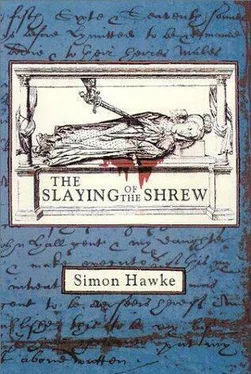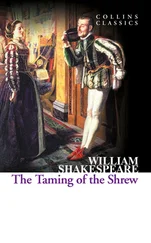Simon Hawke - The Slaying Of The Shrew
Здесь есть возможность читать онлайн «Simon Hawke - The Slaying Of The Shrew» весь текст электронной книги совершенно бесплатно (целиком полную версию без сокращений). В некоторых случаях можно слушать аудио, скачать через торрент в формате fb2 и присутствует краткое содержание. Жанр: Исторический детектив, на английском языке. Описание произведения, (предисловие) а так же отзывы посетителей доступны на портале библиотеки ЛибКат.
- Название:The Slaying Of The Shrew
- Автор:
- Жанр:
- Год:неизвестен
- ISBN:нет данных
- Рейтинг книги:5 / 5. Голосов: 1
-
Избранное:Добавить в избранное
- Отзывы:
-
Ваша оценка:
- 100
- 1
- 2
- 3
- 4
- 5
The Slaying Of The Shrew: краткое содержание, описание и аннотация
Предлагаем к чтению аннотацию, описание, краткое содержание или предисловие (зависит от того, что написал сам автор книги «The Slaying Of The Shrew»). Если вы не нашли необходимую информацию о книге — напишите в комментариях, мы постараемся отыскать её.
The Slaying Of The Shrew — читать онлайн бесплатно полную книгу (весь текст) целиком
Ниже представлен текст книги, разбитый по страницам. Система сохранения места последней прочитанной страницы, позволяет с удобством читать онлайн бесплатно книгу «The Slaying Of The Shrew», без необходимости каждый раз заново искать на чём Вы остановились. Поставьте закладку, и сможете в любой момент перейти на страницу, на которой закончили чтение.
Интервал:
Закладка:
“Indeed, it sounds like a fine idea to me,” said Kemp, nodding with approval. “Put in a few songs, then add a jig or two, and it should prove just the thing to entertain the distinguished wedding party.”
Seeing the stricken expression on his roommate’s face, Smythe suddenly realized that for all his good intentions, he had made a serious mistake, though he did not quite understand just what it was. Yet it seemed quite clear that what he had thought would be a welcome opportunity for his friend to have one of his own plays acted by the Queen’s Men, and in front of an influential audience, at that, was instead regarded by him as a horrible disaster. And when he turned towards Smythe amidst the general discussion of how they might present his play, Smythe saw in his face a look that struck him to the quick. It was an expression of great alarm… and of betrayal.
2
The cathedral of St. Paul, known simply as “Paul’s” to the native Londoner, did not present the sort of quietly spiritual surroundings that Smythe had learned to associate with church during his boyhood in the country. Like the city over which it loomed magnificently, Paul’s was a curious amalgamation not only of architectural styles, but of the spiritual and the temporal as well, the exhalted simultaneously sharing space with the debased.
Surrounded by a stone wall, the churchyard of St. Paul’s was a bustling place of business, full of crowded market and book stalls past which Smythe wound his way as he entered through one of the six gates leading into the enclosure. Within the courtyard, to the northeast, stood Paul’s Cross, which always made him think of a miniature tower with its Norman-styled wooden cross atop a conical lead roof over an open pulpit built atop stone steps. Here, outdoor services were held at noon on Sundays, and important proclamations were read out to the citizenry. In the northwest corner of the yard stood the Bishop’s Palace, near the college of canons and several small chapels. Here, too, could be found Paul’s School, and the bell tower and the chapter house, incongruously elegant and solid compared to the hodgepodge of crudely fashioned merchant stalls thrown up all around the noisy churchyard.
The interior of St. Paul ’s, much to Smythe’s surprise the first time he had seen it, was no less a bustling place of business than the cacophonous outer churchyard. The middle aisle of the Norman nave was known popularly as “Paul’s Walk,” and merchants as well as other, less desirable sorts routinely plied their trades there, even while services were being conducted, so that the choir frequently had to compete with the shouts of sellers hawking their various wares, like the Biblical moneylenders in the temple, whose spiritual if not lineal descendants also could be found doing a brisk business in Paul’s Walk, counting out their coins upon the fonts.
Each supporting column in the cathedral was known for a type of business that could be transacted there. Various handwritten or printed bills were posted on the columns, people looking for work or else advertising one service or another. Smythe passed one column around which several lawyers were meeting with their clients or else negotiating with roisterers and layabouts who sold their honor for a shilling or two to bear false witness against someone in a case. Nearby, an ale seller had set up several small casks beside another column and was offering hardened leather drinking horns to passersby to taste his wares. Beside him, at another column, loaves of fresh baked bread were being sold, and the next column over was a place for buying books and broadsheets. Nearby, small portraits of the city’s aristocracy were being sold, including, of course, all the fashionable courtiers and Her Royal Majesty, Elizabeth the Virgin Queen.
Smythe passed several small tables made of wooden planks placed atop empty wine casks where tailors sold their wares, and further on, men and boys looking for work vied for the attention of prospective employers, who in turn were being distracted by the prostitutes parading up and down the aisle of the cathedral, meeting every strolling gallant’s eye with a bold gaze, a bawdy comment, a hipshot and a wink.
Over the echoing din, Smythe heard the sharp, staccato sounds of hoofbeats on the cathedral floor and quickly moved aside as a cloaked rider in a rakish hat went trotting past him down the center of the aisle, sword swinging at his side. Out for a casual morning canter through the house of God to look over the whores, thought Smythe. While he was certainly no papist, nor especially religious one way or another, Smythe could not help but think that the Dissolution over which the queen’s father, King Henry VIII, had presided had become truly dissolute, indeed. He did not think that he would ever grow fully accustomed to the way that things were done in London.
“Tuck! Over here!”
He turned towards the familiar voice, smiling when he saw Elizabeth waving to him. She was dressed in a long, voluminous, hooded cloak of green velvet that stood out from her body where her whalebone farthingale held her skirts out from her waist, making her seem to glide across the floor as she approached, and she held before her face on a slim rod a fashionable mask of green brocade and feathers, as many ladies did when they went out in public, especially if unescorted. But mask or no mask, Smythe would know her anywhere. Each time he saw her, he was reminded of the first time they had met, and how she had struck him nearly speechless with her beauty.
It had been at the Theatre, shortly after he had started working there with Will, and she had arrived in Sir Anthony Gresham’s coach. Smythe had not known whose coach it was, only that it bore the same crest upon its doors as the coach that nearly ran them down on a country road while he and Will were on their way to London. In the heat of his anger, Smythe had forgotten himself completely as he ran up to the coach and threw open its door, fully intent on dragging out its occupant and thrashing him, gentleman or not, only to be brought up short at the sight of Elizabeth sitting there alone. She had taken his breath away, and Smythe found that familiarity had not diminished in the least the effect she had upon him.
She was nineteen, the same age as he, with pale blond hair, fair skin, and eyes so blue they almost seemed to glow. She was easily the most beautiful woman Smythe had ever seen, and he could scarcely believe that she was still unmarried, despite all her father’s efforts to secure a husband for her. She was stunningly attractive, with a prominent, wealthy merchant for a father, and it seemed as if there would have been no shortage of eager suitors wanting to take her for a wife. However, anxious as he may have been to get his daughter married off, Henry Darcie would not accept just any suitor. In order to be suitable, a suitor for Elizabeth ’s hand in marriage had to be a gentleman, and preferably a titled one who could serve Darcie’s desire for advancement. That alone narrowed down the field considerably, but Elizabeth herself narrowed it down still further.
For one thing, she was tall for a woman, though not as tall as Smythe, who stood over six feet, and most gentlemen who were conscious of appearances-and what gentleman was not? — would not wish to have a wife who towered over them. For another, she was rather willful and independent-some would say spoiled, though Smythe did not find her so-qualities generally far less desirable in a gentleman’s wife than compliance and amiability. And then there was the matter of her age, which could give a prospective suitor pause.
With most young women being betrothed at eleven or twelve and married at fourteen or fifteen, unmarried women of seventeen or eighteen were often considered to be approaching spinsterhood, especially if they came from a good family. And for prospective suitors, aside from the obvious desirability of a more youthful maiden, there was also the lingering question of why Elizabeth was still unmarried at nineteen. A man of position had to wonder what could be wrong with her that she was still unmarried, despite her dowry and her beauty. Immediately suspect would be her disposition. No gentleman of means and social prominence wanted to be married to a shrew.
Читать дальшеИнтервал:
Закладка:
Похожие книги на «The Slaying Of The Shrew»
Представляем Вашему вниманию похожие книги на «The Slaying Of The Shrew» списком для выбора. Мы отобрали схожую по названию и смыслу литературу в надежде предоставить читателям больше вариантов отыскать новые, интересные, ещё непрочитанные произведения.
Обсуждение, отзывы о книге «The Slaying Of The Shrew» и просто собственные мнения читателей. Оставьте ваши комментарии, напишите, что Вы думаете о произведении, его смысле или главных героях. Укажите что конкретно понравилось, а что нет, и почему Вы так считаете.












